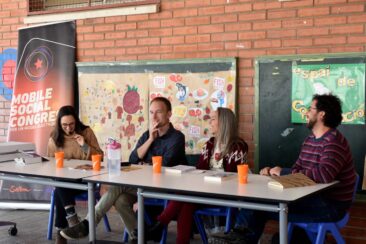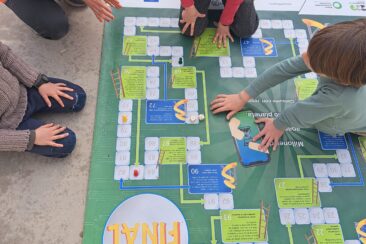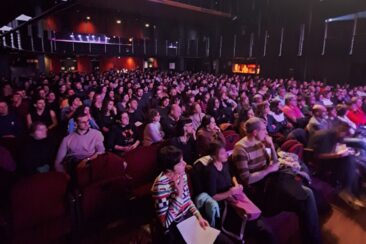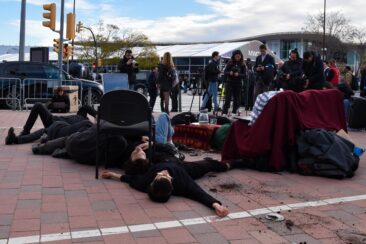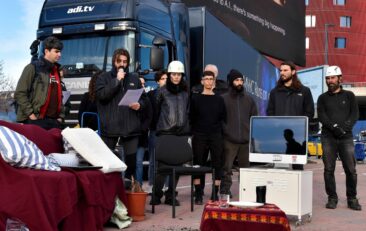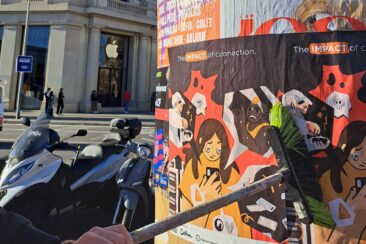
- The MSC, organised by SETEM Catalunya, brought together specialists from all over the world to reflect on the future of digitalisation, faced with the growing importance of information technologies
- Likewise, human rights abuses behind mining and electronics industry supply chains were also highlighted
The Mobile Social Congress (MSC), which was held the same week as the Mobile World Congress, has established itself as an essential space for raising awareness about the impacts of the technology industry. SETEM Catalunya has been organising the event since 2016.
The MSC, which took place from 27 February to 2 March in Barcelona, celebrated its ninth edition with the slogan “High tech, low rights: what is the real cost of the technology we consume?”, emphasising the social and environmental costs involved in the production of electronics and increasing digitalisation. All the links in the supply chain were analysed at MSC, from the extraction of minerals and raw materials necessary for the production of electronics to the use of devices and the point when these, after very little use, become waste. Another focus were the effects of digitalisation on mental health.
The first action, which was not part of the official programme, was a performance at the gates of the MWC on Monday 26 February, titled “The mine at home”. It showed how the effects of the extraction of raw materials, traditionally outsourced to countries in the global South, are worsening and continually affecting more countries.
On Tuesday 27th, the congress kicked off with one of the new features of this year’s edition, the live broadcast of an episode of the podcast “Carne Cruda” in the Paral·lel 62 venue. Experts on different links in the chain of production and consumption of digital technology participated and discussed their respective effects, with special emphasis being placed on the issues arising from electronic waste, on the right to repair as well as social and legislative initiatives for the prevention of such waste.
The impact of lithium extraction on indigenous territories
The programme continued on Thursday 29th with the screening of the documentary “Antes del litio” (Before the Lithium), by Costa Rica Producciones, produced with the support of the Ajuntament de Barcelona (Barcelona City Council) and the Observatorio Plurinacional de Salares Andinos (Plurinational Observatory of Andean Salt Flats). The documentary shows how, currently, in the north of Argentina, there are several ongoing mining projects aiming for the extraction of lithium in local salt flats and mountains, which are inhabited by communities resisting the onslaught of companies and governments that want to exploit these areas without their consent.
Laura Fontana from Alternativa Intercanvi amb Pobles Indígenes, discussed the issue with moderator and journalist Marta Molina, who recognised that the key alternative is degrowth. “What we have to change is our perspective, to transform the parameters of consumption”, she said, bearing in mind that “the harm caused in indigenous territories is alarming”, and that “we must put pressure on the administrations so that they incorporate this perspective into their decisions”.
Human rights abuses in cobalt mining
This was followed by the presentation of the book Cobalt Red, in which writer and activist Siddharth Kara reveals the human rights abuses behind cobalt mining in the Democratic Republic of Congo. Accompanied again by Marta Molina, Kara said, “I travelled several times to the Democratic Republic of Congo to document what is happening in these cobalt supply mines: what I saw is the apocalypse. Hundreds of people, including children, in subhuman conditions. Scavenging with their hands to get cobalt as quickly as possible. Three quarters of the cobalt supply comes from the Congo, mined under terrible conditions. It’s not only a violation of their human rights, but also of their environment”.
The activist explained that when we buy an electrical appliance, we don’t think about it being linked to the deaths of children in Congo, but that this is the reality imposed by technology companies, who do not take responsibility for what is happening in their supply chains. “The companies at the top of these chains that cause catastrophes in the Global South have to ensure equal dignity: the people at the bottom of the chain deserve the same dignity and the same rights as the workers at the headquarters of these tech companies,” added Kara.
Monitoring of factories in China
To reflect on the human rights violations hidden in the supply chains of the electronics industry and on the working conditions under which people work in electronics factories, Dimitri Kessler of the Economic Rights Institute spoke about factory monitoring in China. He identified a punitive work environment, designed to prevent production from slowing down, but said that “if we hold companies accountable for their actions, their behaviour will change”. He also explained the obstacles and difficulties encountered by entities trying to monitor and engage with factories in China, a country marked by strong government repression.
Digital Justice
Thursday’s session closed with a round table on digital justice. Electronics and especially information technology have become increasingly important in recent years. In this ninth edition of the MSC, SETEM Catalunya reflects on what kind of future we want: do we have to accept digitalisation at any price?
The round table featured Leandro Navarro, from the Universitat Politècnica de Catalunya, giving a talk on identity and verifiable credentials for global justice; Cori Crider, from Foxglove, who talked about how to deal with the tech giants. Finally, Sofia Trejo, from the Barcelona Supercomuting Center, delved into the world of artificial intelligence, making the connection to social and environmental justice.
Navarro said that, since machines and tools reproduce who we are, “how can they not be racist or sexist if we are? We can’t remove it surgically”.
Crider, for her part, explained that a third of the humanity connects to platforms like Facebook, Youtube and Instagram everyday, but that “without the work of content moderators, social networks would be full of terrorism, paedophilia and other toxic content. The networks would be much worse, they would be a terrible space. We wouldn’t let teenagers anywhere near them, and companies wouldn’t want to advertise anything. All the profit for the companies would evaporate. Yet big tech companies are not guaranteeing the moderator’s labour rights.”
Trejo added that artificial intelligence predictions are not automatically scientific, objective or true. “In reality, these systems reproduce and amplify historical patterns. The groups most affected are those that have been historically discriminated against: in particular women and minorities. What we are doing is generating potential forms of violence and discrimination on a large scale”.
Childhood and Screens
The MSC closed on Saturday 2nd March with a conference on Childhood and Screens, in which Mercè Botella, from Som Connexió, presented the “Guide for Cruel and Wicked Families”, in which she explains how to introduce the first mobile phone and how to accompany the experience, what is the best age to do so, and why: “In the guide I speak from my personal experience with my daughters; this is more than 10 years ago, and back nobody talked about this subject”. Xavier Casanovas, from the “Plataforma Adolescència Lliure de Mòbil”, spoke about how this movement of families, which is now present throughout Spain, began to organise and what its objectives are, and talked about the use of mobile phones in schools and why it should be regulated: “Society has been waiting for a movement like this to emerge; we do not need scientific evidence on how mobile phone use affects the development of children and adolescents, intuition already makes us see that something is not working (…) we want to delay the use of mobile phones in schools (…) many functions can be covered with a cell phone that is not smart. The writer Sergi Onorato presented the Digital Fasting Guide, and also explained the reasons why it is important that we rethink the relationship we as adults have with our cell phones: “we have to consider the productivist model promoted by capitalism in which we have to be doing things all the time; maybe you shouldn’t listen to a podcast while you are cooking; we need to recover the moments in which we have space to think and create for ourselves”.
Beyond MSC
The Mobile Social Congress is part of SETEM Catalunya’s fair electronics campaign – with the support of the Ajuntament de Barcelona and the Agència Catalana de Cooperació al Desenvolupament (Catalan Agency for Development Cooperation) – which is why the organisation has insisted on the need to further promote spaces for encounters, raising awareness and collective training beyond the MSC. Throughout the year the organisation offers workshops and training on these topics for children and young people. It also publishes and disseminates research and reports on the impact of the technology sector. Another one of SETEM Catalunya’s challenges is to influence public administrations to adopt Socially Responsible Public Procurement criteria and to hold transnational companies accountable in their respect for human rights.
Download photos here.
More information and interview management:
Sara Blázquez | 679 86 45 18 | sara@diesdagost.cat
Josep Comajoan | 699 18 05 46 | josep@diesdagost.cat

